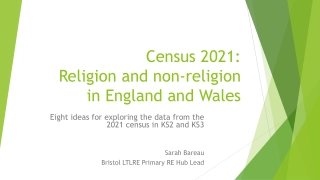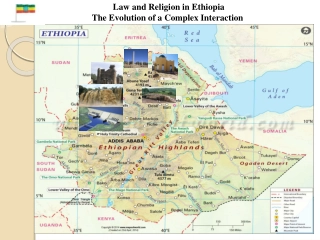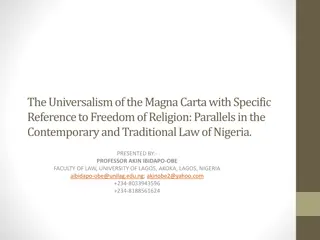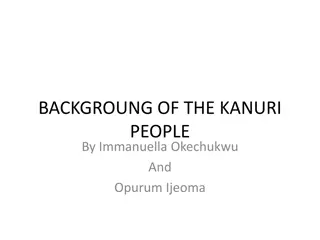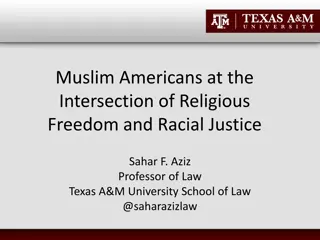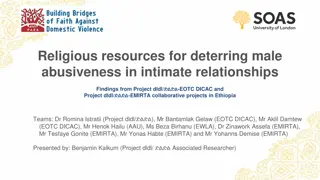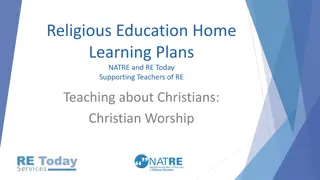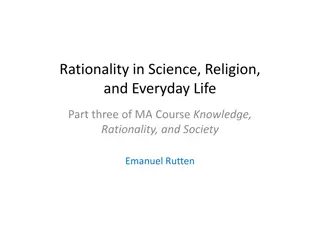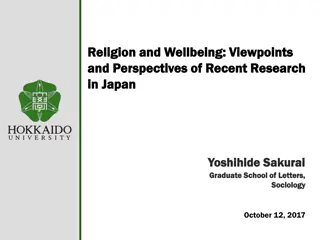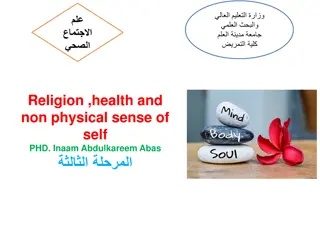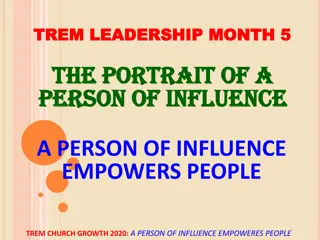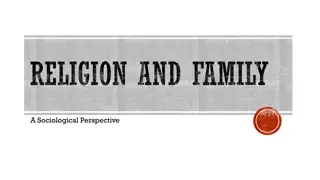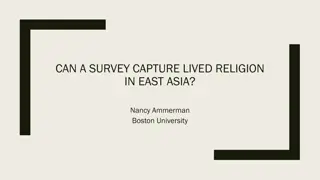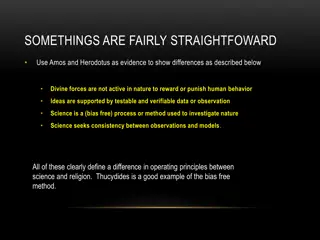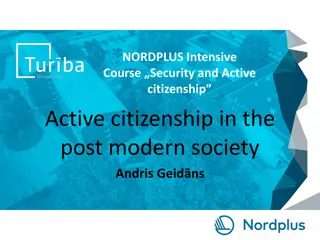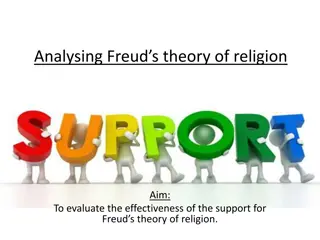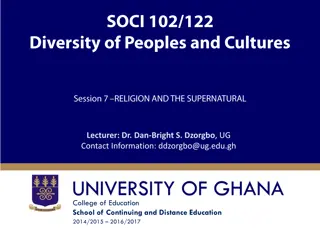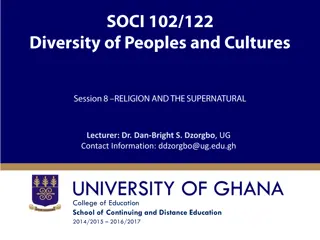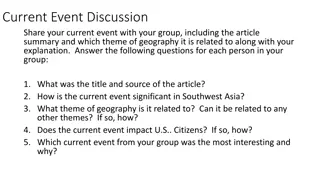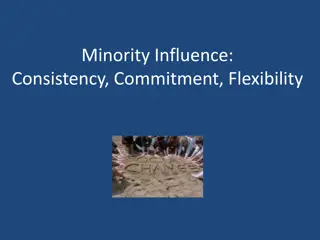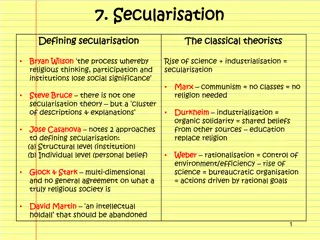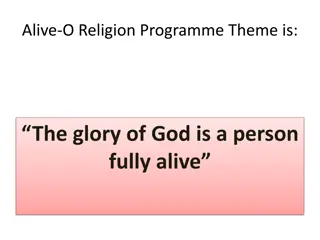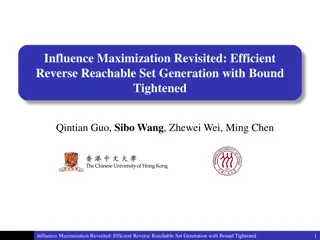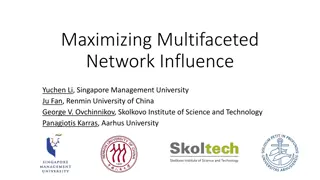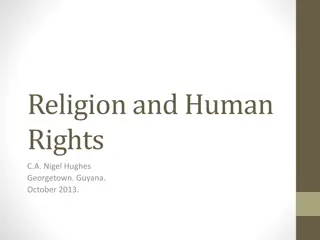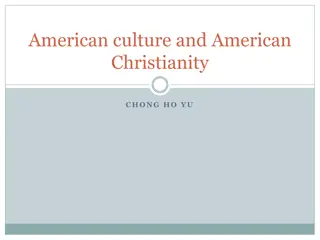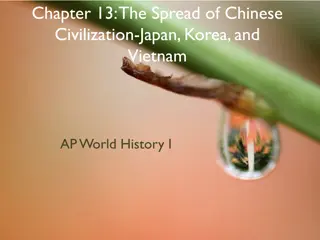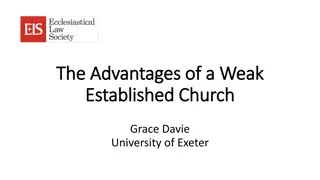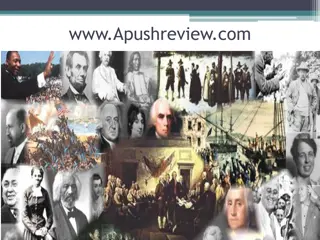Census 2021: Religion and non-religion in England and Wales
Explore ideas for analyzing the religion and non-religion data from the 2021 Census in England and Wales, aimed at KS2 and KS3 levels. Discover trends in percentages, compare global religious beliefs, investigate the distribution of different religions in various regions, and delve into the practice
0 views • 11 slides
Law and Religion in Ethiopia: A Historical Overview
Explore the evolution of the complex interaction between law and religion in Ethiopia, from Imperial Ethiopia to the Communist Era and the post-communist period. Discover the rich historical origins of Ethiopia, including its diverse religious landscape and unique governance structures. Delve into t
0 views • 28 slides
The Universalism of Magna Carta: Freedom of Religion in Contemporary Nigerian Law
Magna Carta, a pivotal human rights document, is explored with a focus on its religious underpinnings and its influence on modern legal systems. The parallels and divergences between Magna Carta and Nigerian customary law regarding freedom of religion are examined. The implications of contemporary N
0 views • 16 slides
Global Concerns: Climate Change, Inequality, and Influence on Government
Climate change and inequality are identified as top global concerns, with a link to government influence and favoritism highlighted. The connection between people's worries worldwide showcases a concerning asymmetrical influence that relates to issues like waste in government spending and vested int
4 views • 22 slides
Features of Jainism: An Overview Presented by Debajit Hazarika, Assistant Professor
Jainism is an ancient non-Vedic religion with roots tracing back to the times of the Indus Valley Civilization. It emphasizes non-violence, self-conquest, and spiritual liberation through 24 Tirthankaras, with Lord Mahavira being the most significant. Jainism stands out with its rejection of caste d
1 views • 7 slides
Insight into the Kanuri People: History, Culture, and Religion
The Kanuri people, an African ethnic group, primarily inhabit the regions of the former Kanem and Bornu Empires in Niger, Nigeria, and Cameroon. With a rich history dating back to the medieval Kanem-Bornu Empire, they are known for their sedentary lifestyle, farming, fishing, and salt processing tra
0 views • 6 slides
Muslim Americans at the Intersection of Religious Freedom and Racial Justice
This research explores how Muslims in America face discrimination post-9/11, leading to the racialization of their religion. It delves into how the intersection of race and religion shapes the social construction of the "Racial Muslim," marginalized from the realm of religious freedom into a subordi
4 views • 18 slides
Religious Resources for Deterrence of Male Abusiveness in Intimate Relationships
This research project, conducted in collaboration with various organizations and experts, delves into the role of religion in deterring male abusiveness within intimate relationships. Findings suggest that religion can serve as a deterrent at both individual and normative levels, emphasizing faith-b
0 views • 9 slides
Analysis of "Le Tartuffe" by Molière: Characters, Themes, and Religious Context
Le Tartuffe," written by Molière in 1669, delves into themes of religion, hypocrisy, and the interplay of characters within a bourgeois household. The story revolves around Tartuffe, a hypocritical character who manipulates the head of the household, Orgon, while others like Cléante and Elmire ser
0 views • 25 slides
Understanding Free Consent and its Components in Indian Contract Law
Free consent in Indian contract law refers to consent that is not influenced by coercion, undue influence, fraud, misrepresentation, or mistake. Coercion involves committing or threatening to commit acts forbidden by the Indian Penal Code to force someone into an agreement. Undue influence occurs wh
1 views • 13 slides
Shobna Gulati: A Contemporary Celebrity Loyal to Religion and British Values
Shobna Gulati, a British actress, writer, and dancer, exemplifies loyalty to her Hindu religion and British values through her successful career in the entertainment industry. Facing challenges of cultural identity, she advocates for women's rights, anti-racism campaigns, and body image issues while
0 views • 10 slides
Exploring Christian Worship: My Life My Religion Educational Programme
Engage in learning about Christian worship through the educational programmes "My Life My Religion" from the BBC. Tasks include defining worship, comparing different types of Christian worship, and understanding the significance of worship to Christians. Explore various forms of worship and express
4 views • 11 slides
Rationality in Science, Religion, and Everyday Life: Exploring Belief Formation and Rational Decision-Making
Explore the essence of rational belief formation across science, religion, and daily life through the lens of cognitive processes, decision-making, and value systems. Delve into the conditions for rational belief, practical decision-making, and axiological rationality to understand human cognition a
1 views • 142 slides
Understanding Secularism: Balancing Freedom of Religion
Secularism encompasses a range of ideas aimed at balancing freedom of and from religion with other rights. It advocates for the separation of religious institutions from state institutions to prevent discrimination and privilege based on religious beliefs. Secularism emphasizes the neutrality of the
1 views • 22 slides
Religion and Wellbeing: Recent Research Perspectives in Japan
Exploring the relationship between religion and wellbeing in Japan, this research discusses the impact of religious beliefs on individual and social conditions, as well as national happiness rankings. It delves into the influence of religions on mental health, social capital, and overall life qualit
1 views • 20 slides
Understanding Spirituality, Religion, and Health in the Non-Physical Sense
Exploring the meanings of spirituality, religion, and soul in relation to personal growth and well-being. Delving into how spirituality and religion impact mental health, coping mechanisms, and overall health outcomes. The importance of mindful awareness and self-care in nurturing a sense of purpose
0 views • 35 slides
Empowering Others: The Key to Leadership and Influence
Empowering others is a crucial aspect of leadership and influence. By trusting, delegating, and supporting individuals, a person of influence can help them reach their full potential both personally and professionally. Jesus empowered his disciples as an example of effective leadership. This process
0 views • 7 slides
Explore Anatolian Religion High School - A Glimpse into Education and Facilities
Anatolian Religion High School, formerly known as Yenimahalle Martyr Omer Halisdemir Anadolu Religion High School, offers education to 985 students with 78 teachers across 56 classrooms. The school boasts various facilities such as conference halls, hobby halls, sports teams, achievements in differe
0 views • 24 slides
Understanding the Intersection of Religion, Family, and Society
Explore the sociological perspective on religion and family dynamics. Religion encompasses a set of beliefs and practices centered around sacred phenomena, shaping social norms and offering meaning. Religious affiliations, beliefs, and attendance reflect individual and collective values. Conservativ
0 views • 43 slides
Understanding Lived Religion in East Asia: Insights from Nancy Ammerman at Boston University
Lived religion in East Asia goes beyond beliefs, focusing on practices, communities, and belonging. Experts suggest looking at ethnographies to understand which practices are considered religious. This concept de-centers belief and emphasizes community discourse and social structures. Gender plays a
0 views • 7 slides
Contrasting Science and Religion Through Ancient Philosophers
The content explores the differences between science and religion using examples from ancient philosophers like Amos, Herodotus, and Epicurus. It highlights how science relies on testable data and unbiased processes, while religion involves divine forces and unverifiable beliefs. The text emphasizes
0 views • 5 slides
Exploring Active Citizenship, Responsibility, and Social Contracts in Modern Society
Dive into the dynamics of active citizenship and responsibility, examining the role of religion, liberalism, and social contracts in shaping societal structures. From the collapse of traditional worldviews to John Locke's theories on religion and society, explore the philosophical underpinnings that
0 views • 10 slides
Critique of Freud's Theory of Religion: Examining Evidence and Key Criticisms
The analysis delves into Sigmund Freud's theory of religion, evaluating its support and challenges. The presentation highlights key criticisms regarding historical, anthropological, and psychological evidence, as well as Freud's conclusions on religion. Critiques focus on the lack of evidence for co
0 views • 19 slides
Understanding Religion and the Supernatural in Society
This session introduces the concept of religion and its connection to the supernatural, exploring various definitions, sociological and anthropological perspectives, theories, and functions of religion. The session aims to enhance understanding of religious diversity and the significance of supernat
0 views • 10 slides
African Traditional Religion and its Beliefs: An Overview
Understanding African traditional religion involves exploring the concept of the Supreme God, ancestor worship, witchcraft, magic, sorcery, and divination. This session delves into the relationship between religion, social rituals, and festivals, illustrating how it contributes to social solidarity.
0 views • 12 slides
The Influence of Religion and Oil in Southwest Asia
Southwest Asia, particularly the Arabian Peninsula, is significantly impacted by the interplay of religion, politics, and oil. The region's heavy influence of Islam, with practices such as the Five Pillars, has united its people culturally. Additionally, the discovery of oil in the region post-World
0 views • 9 slides
Understanding Undue Influence in Legal Contexts
Exploring the nuanced concept of undue influence in legal matters, this content delves into the distinctions between suspicious circumstances and undue influence. It touches on the factors considered in determining undue influence, such as control, dominance, fear, vulnerability, and indicia of infl
0 views • 13 slides
Understanding B.C.V. Religion: A Biblical Perspective on Faith and Practice
Explore the concept of B.C.V. Religion through the lens of Biblical teachings, emphasizing the importance of adhering to Scripture and living a life that glorifies God. Delve into the origins of the Restoration Period and its impact on modern faith practices, focusing on key figures and their emphas
0 views • 26 slides
Impact of Geography and Religion on African Society
African society was heavily influenced by geographic features such as diverse climates, terrains, and the Bantu migrations, which spread language, technology, and farming techniques. Additionally, religion, specifically animism, shaped beliefs and practices. The question posed at the end challenges
0 views • 8 slides
Understanding Minority Influence: Consistency, Commitment, and Flexibility
Minority influence involves a small group of people persuading others to adopt their beliefs, attitudes, or behaviors, leading to internalization and social change. Consistency plays a vital role in exerting influence, as it encourages others to rethink their own views. Commitment, demonstrated by l
0 views • 15 slides
Understanding Secularisation: The Decline of Religious Influence in Society
Secularisation refers to the process in which religious thinking, participation, and institutions lose their social significance. This phenomenon is influenced by factors such as the rise of science, industrialisation, changing social attitudes, and the disengagement of the church from society. Evid
0 views • 8 slides
Exploring the Alive-O Religion Programme Theme: The Glory of God through Engagement
This content delves into the Alive-O Religion Programme theme of the "glory of God is a person fully alive." It reflects on the special nature of students in different classes, emphasizing the importance of recognizing one's goodness, being connected, acknowledging wrongdoing, respecting oneself and
0 views • 4 slides
Efficient Reverse Reachable Set Generation for Influence Maximization
This research revisits the influence maximization problem, focusing on efficiently generating reverse reachable sets with tightened bounds. The Independent Cascade (IC) model is explored along with existing solutions based on Random Reverse Reachable Set. The concept of RR sets and their significanc
0 views • 17 slides
Unlocking Multi-Faceted Network Influence Challenges
Exploring the complexities of social influence in maximizing network impact, addressing assumptions in influence maximization works, and real-world campaign dynamics. Delve into quantifying adoption processes with diverse messaging for enhanced influence outcomes.
0 views • 24 slides
Religion and Human Rights in Guyana
Guyana, an English-speaking country in South America, upholds the freedom of conscience and religion as enshrined in Article 145 of its Constitution. This article guarantees individuals the right to freely practice, change, and manifest their religion or beliefs in public and private settings. It al
0 views • 12 slides
Influence of American Culture on American Christianity: A Critical Analysis
This content explores the relationship between American culture and American Christianity, discussing how religion reflects the cultural values of individualism, optimism, and the concept of a blessed nation. It delves into the concept of Biblical individualism, the influence of prosperity gospel, a
1 views • 7 slides
The Influence of Chinese Civilization on Heian Japan
Heian Japan, ruled by the Yamato Imperial Family, experienced a cultural peak during the classical Heian period (794-1185). The Emperor, though symbolic, held sacred lineage while real power lay with the Fujiwara clan. Chinese influence shaped early Japanese culture through Buddhism, Confucianism, a
0 views • 19 slides
Reflections on Religion in Europe: Long-term Perspectives and Contemporary Challenges
Several decades of research on religion in Europe have revealed a distinctive pattern that highlights both the presence and absence of religious influences. The context of cultural institutions, historic churches, shifting societal norms, and increasing diversity poses both opportunities and challen
0 views • 26 slides
Future of Equality Law at Work: Race, Religion, & Belief (October 2017)
Explore the future of race, religion, and belief discrimination post-Brexit, focusing on case law developments. Delve into the origins of discrimination laws, including Equal Treatment Directive 2000/78 and Equality Act 2010. Dive into Article 9 of the ECHR, examining the right to freedom of thought
0 views • 12 slides
Religion's Impact on Colonial Development: A Comparative Analysis
Explore the influence of religion on the development of colonial society in New England, Chesapeake, and the Middle Atlantic regions. Compare how religion shaped political power, education, and societal structures differently, from the Puritan settlements of New England to the religious tolerance in
0 views • 8 slides
